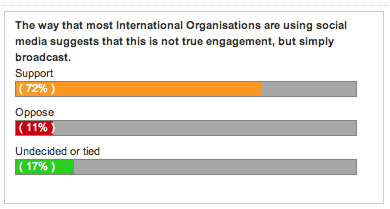E-participation webinar – Social Media and International Organisations
Updated on 05 April 2024
There was a good turn out for Diplo’s E-Participation Webinar on Tuesday 21 May. The full recording of this webinar can be found here:

This is the first of a series of three blogs covering the webinar and the Oxford-style debates.
The backdrop for the three debates was the statement: Social media, open gov/open data initiatives and remote participation are opening up international organisations and development agencies. The increased use of cloud-based technologies is making organisations more consultative, transparent and accountable. True or false?
The first debate kicked off with the statement:
“The way that most international organisations are using social media suggests that this is not true engagement, but simply broadcast. True or false?”
In supporting this statement, Pete Cranston of Diplo argued that :
- Social media is about engagement, conversation and personal relationships.
- The majority of international organisations have a broadcast mindset that does not foster the formation of individual communication relationships.
- New media requires experimentation and some degree of risk. However, bureaucracies have a hierarchical structure and are naturally risk averse. This type of corporate culture does not encourage staff to be creative and experimental.
- International organisations need to understand that the world is changing. Institutional boundaries no longer form the basis of relationships.
- We live in increasingly networked society that is hard to control.
Pete’s presentation is available here.
In opposing this statement, Paul Conneally, Head of Communications at the International Telecommunication Union, argued that:
- International organisations are evolving rapidly in their use of social media.
- At the ITU, social media has become a fundamental part of the communication strategy.
- The key words in this strategy are: conversation, engagement and community.
- In using social media, staff members are encouraged to find their own voice when engaging with their own communities and to amplify key ITU messages.
- ITU uses several social media platforms and has thousands of followers and impressions.
- The two main platforms are twitter and facebook.
- Engagement and conversation in these social media channels requires considerable resources.
- Engagement also depends on well defined organisational social media strategies and priorities.
Participants were invited to vote after each debate. The result of the first vote was as follows:
Some comments from participants:
|
John Harris: Surely, hashtags don’t push engagement they just simplify search and connectivity? Don’t communities look for human dialogue through social media? |
|
Tim Davies: Agree with Pete that true social media engagement involves empowering staff. But this does requires us to rethink notions of ‘bureaucratic rationality’ and what we can expect from institutions which become much more clearly networks of people, rather than uniform entities. |
|
Martina Ucnikova: Empowering staff to use social media is important however how do you ensure that your staff uses the right language and communicates the right messages as per your communications strategy? Not many social media users understand the difference between personal and non-personal use of SM. |
Despite some persuasive arguments by Paul Conneally of the ITU, the audience tended to agree with the statement that International Organisations are not truly engaging with their followers.
These issues will be revisited on E-participation day – Towards a more open UN where we will be joined by speakers from WHO, Global Fund and UNDP.
My next blog will cover the second debate: “Remote Participation programmes and initiatives make International Agencies moretransparent and inclusive. True or False”
Related blogs
Related events
Related resources
Subscribe to Diplo's Blog
The latest from Diplo and GIP
Tailor your subscription to your interests, from updates on the dynamic world of digital diplomacy to the latest trends in AI.
Subscribe to more Diplo and Geneva Internet Platform newsletters!
Diplo: Effective and inclusive diplomacy
Diplo is a non-profit foundation established by the governments of Malta and Switzerland. Diplo works to increase the role of small and developing states, and to improve global governance and international policy development.



Great summary. Good to have
Great summary. Good to have participated.
One addition to Guy’s
One addition to Guy’s excellent summary: Paul talked about a fascinating project – on Twitter it was #GirlsinICT aka #TechNeedsGirls – which succeeded in engaging more than 2m people on International ‘Girls in ICT Day’ in April. Definitely a promising ‘exception’ in my terms, and one that can be learned from